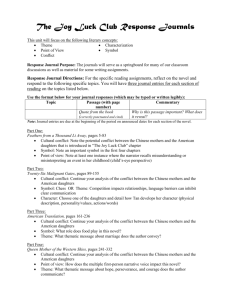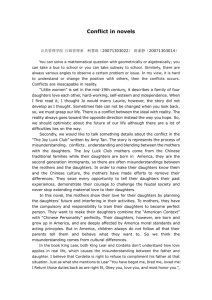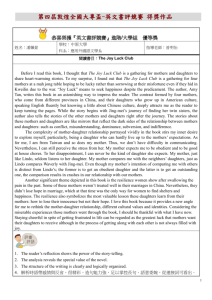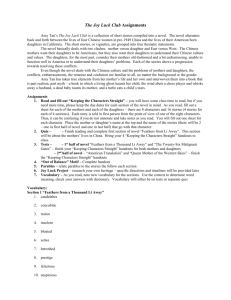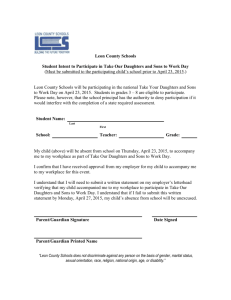Presentation
advertisement
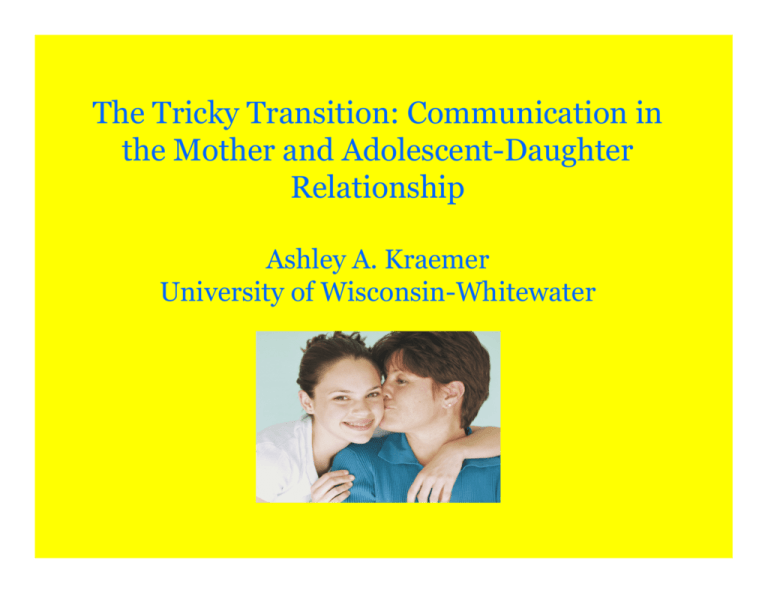
The Tricky Transition: Communication in the Mother and Adolescent-Daughter Relationship Ashley A. Kraemer University of Wisconsin-Whitewater Purpose of Study: • To explore how dialectical tensions of openness & closedness and autonomyconnection, play out in the relationship of mothers and daughters. Leslie Baxter’s (1988, 1990) work on Dialectical Tensions • A dialectical tension is …..what results when two people in a close relationship try to meet opposing needs—like the need to be close and the need to be their own person. – Openness-closedness centers on our need to tell our loved one everything as compared to the need to keep some things private. – Connection-autonomy centers on our need to be interdependent vs independent. • The Literature Review also drew upon articles focusing on listening, disclosure, and conflict in mother-daughter relationships. Methodology The study used a qualitative approach because I wanted daughters and mothers to go in-depth in describing their relationships so that I would have a better understanding about how the tensions were experienced in mother and adolescent daughter relationships. Participants • 4 focus groups: 1) 7th grade daughters 2) 7th grade mothers 3) 11th grade daughters 4) 11th grade mothers The interviews lasted about an hour and were audiorecorded and data transcribed. Data Analysis • Transcripts were analyzed to find which statements and stories seemed to fall under each dialectical tension. This was difficult as some statements could be applied to both openness-closedness and autonomy-connection Results and Discussion I. Openness-closedness: I could see evidence of this dialectical tension in both daughters’ and mothers’ descriptions of their relationships—sometimes they were close and sometimes daughters preferred not to self disclose to moms II. Connection-autonomy: openness relates to connection and closedness relates with autonomy. Listening promotes more Openness • When parents show a willingness to listen, daughters, in turn, will show a willingness to self disclose. • Limit distractions • Common places to talk: car, bedroom, kitchen Defensive climates produce more Closedness • When mothers act “too busy” to talk to their daughters, this may cause a defensive climate • Closedness also occurs when daughters tell their friends things that don’t feel comfortable telling their moms. Focus group excerpts that relate to Openness-Closedness • 7th grade daughters: • “I think my mom listens well and then she gives me good advice and I just feel better because I told her” • “Sometimes I will be talking to my mom and she’ll be adding up bills or reading at night and I’m talking to her, I’ll ask her something and it just seems like she is too busy” • “Sometimes if something bad happens or something, sometimes its easier to go to friends because they know who you’re talking about and your parents don’t really understand and why it’s a problem” Focus group excerpts that relate to Openness-Closedness • 11th grade daughters: • “A lot of my friends went behind their mother’s backs and went to planned parenthood by themselves, but I didn’t want to hide this from my mom, and we have the sort of relationship where I felt comfortable going to here. It was stressful but it felt good to go to her.” • “In middle school I thought my mom was so mean when she wouldn’t let me do things, however, I noticed if I actually talk with my mom instead of throwing a fit, the solutions are much better.” Connection/Autonomy • Connection was shown when mothers and daughters --talked (like in the car) or did activities together (prepped dinner together or share same interests). • Autonomy was shown when mothers and daughters – when daughters went to their peers before their mothers, teens “needing alone time,” and teens thinking they are complete opposites from their mothers Daughters sometimes wanted autonomy which caused conflicts with mothers. • Inevitable in any relationship!!! • Common areas of conflict: – Clothing – School work – Chores – Disobedience – General irritations Focus group excerpts that relate to Connection-Autonomy • 7th grade daughters: • “My mom doesn’t let me do stuff, like I’m not old enough like its wrong to do it at certain ages. Like if I wanted to go to McDonalds or a movie she wants to know where I’m at, but it seems like she doesn’t want me to, she’s worried and stuff, but nothing happens. Like I always need someone to walk me home and stuff, please.” • I’m real neat and my daughters room is just a mess, total disaster, she’s not organized at all and I am so organized. She loves to be socially involved outside of the home, and I am more of a family kind of person.” Focus group excerpts that relate to Connection-Autonomy • 11th grade daughters: • “All my friends have curfews that are later than mine and it drives me nuts, and my mom just says its for your own good.” • “I use to cry if they wouldn’t let me go somewhere with the car, and my mom would get mad at me, then I realized if I acted mature and just said okay, then they would see I was mature and let me have more lea way.” • “I love going grocery shopping with my mom, we go every Sunday morning and its fun. Then sometimes we stop for Starbuck’s Coffee because we both love it!” Discussion • Limitations: • 1) 4 fairly small focus groups = can’t generalize entire population • 2) Wide age gap • 3) Career moms vs. Stay-atHome moms? • 4)Participants were all European-American, middle class women (more variation in ethnicity and class). • Future Research: • More variation in participants • Look at different generations = Does society impact the mother-daughter relationship? Special Thanks To: • * My participants of the 4 focus groups Thank you for your willingness and cooperation! • *Dr. Barbara Penington [UW-W mentor] Without your help and encouragement…this would never have occurred. Thanks for the constant support
